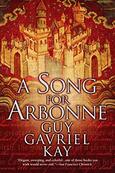Sacred Chickens
Menu
SACRED CHICKENS
 This book was published in the early 90’s, and while we usually try to review books that are more recent, we also know that recently published books are not the only good ones out there. So occasionally we pick older books that we think are worth re-examining. Or, perhaps you’ve already read this book, but a little reminder will inspire you to re-read it. Either way, enjoy and happy reading! A Song for Arbonne is a book that is right up my alley: Fantasy, magic, quests- it really is a great book for my summer reading. I mean, I would read it anytime, but it was made better by the season. Fair warning, the book doesn’t shy away from the darker side of things- degradation and violence are an aspect of the book, but it is tempered by the books message of rising above those things. The book is set in a region inspired by Medieval France. The book goes through all four seasons but starts in the summer. The fantasy summer in France makes the hot, humid summer of the South a little more tolerable. Reading about meadows baked in the summer sun, festivals by the river, fields of lavender, The Court of Love and the troubadours, I could almost forget that I was soaked in sweat just from being outside for a few minutes. The plot of this book was enthralling. It centers around a feud developing between two countries: to the South is the matriarchal, cultured land of Arbonne, and to the north is Gorhaut, whose leaders are determined to wipe out the worship of a female deity in favor of their own masculine god, Corannos. Gorhaut is only interested in the subjugation of women, as is evidenced by their despicable treatment of women in the country. I believe this war was inspired by an actual struggle that took place between the French and the Languedoc. Throughout the novel, I could not help but notice how this reflects the conflict in our own society, between the patriarchal institutions that built our society, and the equality movements of today. It is not always a physical struggle, but it is just as imperative. At the time of the war between Arbonne and Gorhaut many thought that the society was improving, moving, albeit slowly, in the direction of equality. As Arbonne discovered, the path towards equality may prove more difficult than we first realized. Caught between these two warring factions is the mysterious Blaise, a mercenary from Gorhaut who enlists in the service of the Arbonnais Duke Betrain de Talair. He is a complex character who plays a key role in the book. Blaise does not appear to be as prejudiced against women as the rest of Gorhaut, but the misogyny he was raised in appears in subtle ways at first in his dislike for Arbonne and the Goddess, but gradually he grows to enjoy being there. Once a person is humanized or the humanity of a place is realized, it becomes more difficult to destroy it. The Goddess of the novel is interesting to me. She is neither kind nor cruel, gentle nor violent. She does not nurture, but neither does she destroy. She exists, and she wields a power that Gorhaut does not and cannot understand much like witchcraft in our world, which has always been about women having a secret power that men cannot control, and which threatens them. Arbonne worships the goddess, and the women of that country have power, both the rulers and the priestesses, but Gorhaut cannot abide such equality. They feel threatened. In my opinion, novels that engage the political climate (this struggle did not start in 2016) are some of the best. Ignoring it has never been of any interest to me. It’s like ignoring reality, and try as we might we cannot escape reality, and that includes politics, which is why I never understand when people say politics should be taken out of a particular thing, like sports or the Oscars. Readers take the context of their own time into every book that they read. A Song for Arbonne is also just a wonderful story, and all good stories teach us something, don’t they? They take us on a journey, but they also convey a message. And, from a reader and writer’s perspective, it is very good. It’s wonderfully constructed, just long enough, and leaves no stone unturned. The main plot and the subplots are balanced, and one does not overpower the other. It’s an interesting concept, and never boring. I was glued to the page from the first page to the last. I have no regrets about picking this book up, and I thoroughly enjoyed it If you haven’t read the book, or even if you have, I would encourage you to pick this book up, not only for the story but for the hopeful message it sends. I think we could all use it right now.  Bio Jarad is the co-administrator and writer for Sacred Chickens, attends college at MTSU, loves tea and coffee, and tries to spend every spare second reading. He recently developed an interest (some might say obsession) with gardening. Jarad is an English major with a concentration in literature. Bless his heart! Let's all light a candle for him and send him happy thoughts!
0 Comments
Leave a Reply. |

Click Photo above to buy ebook or paperback from Amazon.
Here's the link to Barnes and Noble Or order through your favorite independent bookstore! Categories
All
|
 RSS Feed
RSS Feed